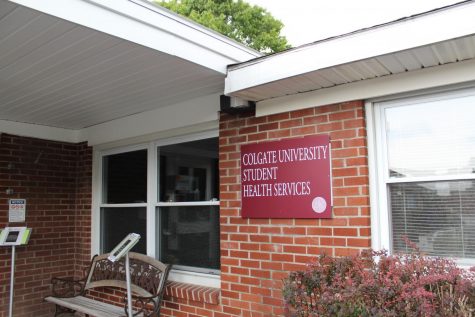Study Abroad Plans Disrupted for Colgate Students
The Office of Off-Campus Study (OCS) has officially suspended all international study group abroad programs and one domestic program for the upcoming Fall 2020 semester. The Office of Off-Campus Study notified students by email on May 2 that programs in Australia I, Cape Town, Madrid, Manchester, Singapore, Venice and Santa Fe have been suspended. The London Economics program was also suspended on May 2, but was moved to the spring semester on May 7. The National Institute of Health (NIH) study group in Washington D.C. has not been suspended at the time of publication.
According to Associate Director of Off-Campus Study Casmir (Cas) Sowa, Colgate has not canceled any approved program options. However, the Institute for Study Abroad — Butler (IFSA) has canceled several of its programs in the Southern Hemisphere for Fall 2020 this past week, including New Zealand, Australia and Latin America. The Center on International Educational Exchange (CIEE) has reorganized their programming worldwide and is no longer offering two programs on Colgate’s approved program list for the Fall semester, one to Senegal and one to Ghana.
Off-Campus Study Program Manager Wendy Nugent sent out an email to students on the above study groups on May 2 officially announcing the suspension of these programs. The email listed travel warnings by the Center for Disease Control (CDC) and the U.S. Department of State, strict border controls, availability of international health coverage and elimination or reduction of international flights by airline carriers as factors that led to the suspension of programs. Additionally, the email explained that the Office of Off-Campus Study had concerns about whether “academic and cultural experiences” such as homestays in Madrid, internships in London and travel excursions in all programs would be possible.
“We deeply regret that we have had to suspend the fall operation of the study group and we know how disappointed you must be in this outcome, but we reached this decision placing a priority on your health, safety and academic experience. Colgate continues to be committed to off-campus opportunities and is reviewing all potential options available to you,” Nugent’s email read.
Each individual email listed potential options for each specific program. For the Madrid and London Economics study groups, running the program in the spring was listed as a potential option. For Australia I, Nugent said OCS was reviewing the potential to have students join the Australia II study group in the spring or join an approved program, but offered no formal guarantees in the May 2 communication.
Provost and Dean of the Faculty Tracey Hucks and Vice President and Dean of the College Paul McLoughlin addressed the suspension of study groups in an email to the Colgate community on May 7.
“We seek to provide to all of our students the possibility to pursue those opportunities that are hallmarks of a Colgate experience. Students whose 2020 fall study abroad experiences were canceled due to COVID-19 will be offered the opportunity to study abroad in spring 2021,” the email read.
On May 7, A. Lindsay O’Connor Professor of American Institutions Kay Pollack and A. Lindsay O’Connor Professor of American Institutions in the Department of Economics Adrian Hyett, the professors leading the London Economics program’s group, sent an email announcing that the program will run in the spring. This means the fall group will run alongside the Spring London Economics program, led by Professor of Economic Studies Richard M. Kessler. The email read that the structure will be similar aside from a few changes and Waldman, Pollack and Hyett will work together to provide a “common” and “rich” experience for the students.
The email stated uncertainty around whether the rescheduled study group will be able to offer the students internships due to the United Kingdom’s economic recovery and whether or not the group will be able to take excursions outside of the U.K. It went on to state that concrete details will be shared in the fall. The students must notify Nugent, Waldman, Pollack and Hyett by May 25 of their decision to participate or withdraw.
Sophomore Nina Armideo was one of 18 students accepted to the Fall London Economics Study Group. Armideo said she was disappointed but not necessarily surprised given the current climate when the program was first suspended. She now says she is unsure of how to proceed.
“I am happy it’s an option but unsure what I want to do, especially without knowing fall plans,” Armideo said.
According to Australia study group participants, they received an email from the University of Wollongong (UOW) on May 1 before they heard about the status of their program from the Office of Off-Campus Study. The communication detailed that UOW, where students live and take courses on the study group, would be continuing remote instruction for their upcoming Spring 2020 term beginning in late July.
“At this stage, the Australian government has not indicated when travel restrictions and social distancing measures will be lifted. To give current and future students certainty, UOW has decided to extend remote teaching mode into Trimester 2, 3 and Spring session 2020,” the email to all exchange program students said.
The communication gave exchange student program participants the option to take their UOW courses remotely in the planned term with the possibility of in-person instruction in Australia beginning mid-term should travel restrictions lift, or to defer their enrollment to the following term beginning in early 2021.
Sophomore Kate Connelly said that while she felt the decision to suspend the program was timely, she felt frustrated when she heard first from the partner university and felt left out of the loop by OCS.
“I appreciate that [Colgate] waited to officially cancel the program in hopes we could still go, but again, I wish they would have kept us in the loop of the decision process,” Connelly said.
Connelly admits she feels frustrated that there was no other possibility presented to move her program to the spring semester, nor did they guarantee an option of joining the spring study group, despite UOW guaranteeing students they could defer their admission.
“I do not think [Colgate’s] decision was fair. The partner university is allowing us to defer our acceptance to the spring semester so that we can still fulfill our abroad experience,” Connelly said. “Colgate is not allowing us to push our abroad program to the spring.”
Sophomore Ashley Thomas said that as a transfer student, she doesn’t have the option to switch to an approved program and feels nervous she may not be able to go abroad if her program isn’t rescheduled.
“I was super disappointed with the suspension of my study group because the alternate plan of doing an approved program doesn’t work for me as a transfer,” Thomas said. “A big reason why I came to Colgate was so that I could still study abroad as a transfer and now I am unsure if I will be able to.”
No other programs have received more information at this time.
Director of Off-Campus Study Joanna Holvey Bowles explained that every study group is unique and the logistics of running a program in the spring vary between programs. Due to these differences, Bowles said, it is not possible to set a concrete timeline for when these decisions will be made. The London Economics group contained two unique factors that allowed for the decision to be made sooner than the other programs.
“[The] students do not take courses at a local host university. In addition, the faculty directors for that program are adjunct Colgate faculty that live in London, facilitating that aspect of shifting the program,” Bowles said. “These factors allowed us to make a more rapid determination that running the program in the spring is feasible. We are doing everything that we can to make a determination about the feasibility of shifting other programs to the spring as soon as possible.”
Bowles said other factors that may affect the ability for a program to run in the spring are country-specific border and travel restrictions, availability of study-group directors, ability of host institutions, availability of housing and availability of adjunct instructors.
“We are hoping that it will be possible to move many of our fall study groups to the spring semester. However, should that not be possible or should students prefer, they would be able to apply for non-Colgate approved programs in the spring as well,” Bowles said.
The only program that the Office of Off-Campus Study continues to plan to operate during the fall semester is NIH in Washington, D.C. Bowles listed some of the factors that will be key to the operation of the program including the re-opening of NIH labs to visitors and the re-opening of student dormitories. Bowles said they hope to have more information by June or July, which falls after housing selection and class registration for the fall.
“We have been able to make special accommodations to allow students on the NIH program, as well as any student on a fall approved program, to register for two courses and housing on-campus on a provisional basis should their program not be able to run in the fall,” Bowles said.
Approved Programs
Sowa explained that approved program options are run by organizations separate from the University, and it is those organizations that make cancellation decisions. Although he said the Office of Off-Campus Study cannot answer how many programs will be canceled, most programs hope to still run in the fall if possible.
“Most study abroad programs use similar criteria as Colgate on whether to operate — US State Department recommendations, CDC recommendations, host government recommendations, etc,” Sowa said. “ If the programs are still operational and meet the general government guidelines above, students may still apply and enroll if they would like.”
Sowa said it is up to the organization running the program when to notify the students of changes and that some have said they hope to know by June or July.
Before social distancing was enacted, Sowa said they had roughly 150 students applying to approved programs. Since then, many have withdrawn their applications or requested to study abroad for the Spring 2021 semester instead of the fall.
Sophomore Lily Haynes is one of those students. Before the COVID-19 pandemic, she was planning to go to Salamanca, Spain on an Institute for the International Education of Students (IES) approved Language and Area Studies program for the fall. However, she said when Colgate was required to transition to online learning in March, she began reconsidering her fall semester. After talking to her friends and parents, she decided to rescind her commitment last week.
“I have always dreamed of going abroad during college, so this was a very hard decision for me. However, I ultimately decided not to go because it seemed practically impossible that my trip to Spain would run as scheduled,” Haynes said. “Even if I was allowed to go, the entire experience would be different due to the lasting social distancing impacts of the virus.”
Haynes said many of her friends also rescinded their commitments, or have had their programs canceled.
“The few that are still holding out are losing hope quickly,” Haynes said.
Sowa said that although individual cities or countries have canceled specific programs in the past due to political unrest or natural disasters, the difference with the COVID-19 pandemic is the simultaneous global impact.
“US government travel restrictions currently in place have not been seen for all areas of the world since Wartime,” Sowa said.
Housing Selection and Class Registration
Both Haynes and Armideo shared concerns that the influx of students on campus could make the Housing selection processes and class registration process more difficult. Armideo said she is optimistic that Colgate is exploring all options, but Haynes is wary.
“It seems as though Colgate already has a bit of a housing shortage, especially with our large class, so I’m not exactly sure how that will play out for the fall,” Haynes said. “I also always have a bit of trouble registering for classes, especially if not in one of the first two time slots, so I think that will definitely be a little more challenging this year as well.”
The Office of Residential Life did not respond to a request for comment.
University Registrar and Director of Institutional Planning, Assessment and Research Neil Albert said the Office of the Registrar is in “regular and ongoing” contact with the Office of Off-Campus Study. He explained that he is aware of the cancellation of study groups and the Office of the Registrar receives specific notice each time a student is approved or cancels their off-campus study.
“One of the Associate Registrars serves on the Off-Campus Study Committee, which has been meeting remotely since the break. Everyone who works in the Office of the Registrar is involved in at least one recurring process that requires them to work from and provide information to the Office of Off-Campus Study,” Albert said.
Albert explained that the uncertainty facing students planning to study off-campus was one of many factors that resulted in the Academic Affairs Board postponing academic registration until June 1-3. He said this was because off-campus study decisions affect how many students are expected to register for the fall term.
“That decision to delay was productive in this regard; since that decision, there is more clarity about the study group plans, and there has been time to change policies that could allow some students to participate in approved programs in the fall,” Albert said.
Albert confirmed that registration preparations are still focused on starting registration on June 1.
“Because this process does not require physical attendance, it is hard to envision likely scenarios that could lead to additional delays at this point,” Albert said.
Hucks and McLoughlin provided instruction to both students who are no longer studying abroad and those still enrolled in approved programs for the housing process.
“Students who are currently enrolled in off-campus study approved programs and those who no longer plan to study abroad in the fall will have the opportunity to select housing with their peers in the housing lottery and should do so even if their approved program has not yet been canceled. This will ensure that all students will have on-campus housing this fall,” the email read.
Refunds
Both Sowa and Bowles addressed the possibility of refunds. For approved programs, Sowa explained that most programs will refund any deposits if the program is canceled. Programs will contact students directly with information related to cancellations.
“Some programs have given students up to a week before a program begins to withdraw without a financial penalty. Each program sets their withdrawal policies, but most seem to be more flexible this year,” Sowa said.
Bowles said that students will be able to move their deposit to a spring study group or an approved program. If they no longer wish to study abroad, Bowles said they will receive their deposit back.
Kelsey McGeough is a senior from Weston, Massachusetts concentrating in English. She’s previously served as a news editor and staff writer. She is involved...

Kirby Goodman is a senior from Minneapolis, Minnesota concentrating in peace and conflict studies with a minor in political science. She's previously served as...











